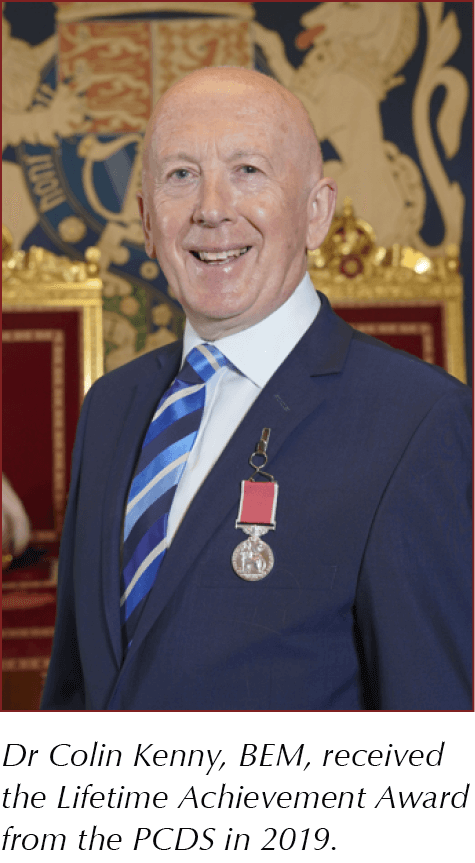It was a great pleasure, at our national conference in November, to see the 2019 Primary Care Diabetes Society (PCDS) Lifetime Achievement Award presented to Dr Colin Kenny, founding Chairman of the PCDS and my predecessor as Editor-in-Chief of Diabetes & Primary Care. After a long career in general practice and receipt of the British Empire Medal for services to diabetes in Northern Ireland, Colin has retired as Editor-in-Chief of Diabetes Distilled to pursue a new global diabetes education role.
I am pleased to announce that Kevin Fernando and I have jointly taken over his role and, every fortnight, we will share practical messages from a recently published paper relevant to primary care diabetes. We will also deliver the very popular Diabetes Distilled sessions at PCDS conferences throughout the year, providing short, snappy, “need to know”, educational updates. In such a rapidly changing diabetes environment, Kevin and I are excited to have these opportunities to help you stay up to date with new developments.
Kevin continues in his role as Education Editor of GPnotebook Education and, in this issue, shares a GPnotebook Shortcut on the management of hyperglycaemia in those with chronic kidney disease. We hope that by integrating resources from GPnotebook into the Journal on a regular basis, you will be able to experience the value of GPnotebook, and be tempted to explore that resource as well as this journal.

In this issue
This issue of the Journal includes a review of Professor Roy Taylor’s book Life Without Diabetes in our occasional series “What people with diabetes are reading”. He and I shared a Professor of Physiology, only a few years apart, as medical students in Edinburgh. I have to say, Professor Taylor has made much better use of the excellent grounding we received than I have, persevering in asking questions and continuing his research quest until he and colleagues have demonstrated that diabetes remission is an achievable reality and helped us understand how to make it happen. This book should be required reading not just for motivated people with type 2 diabetes, but for all of us who manage it. By better understanding the twin cycle hypothesis and the benefits of weight loss, I believe we should all be inspired to support people to achieve diabetes remission or, at least, improve control. I hope you will read my summary and be motivated to purchase your own copy of the book to read, learn and share.
Dietitians played a key role in the DiRECT study as well as in many other primary care diabetes studies. Yet many of us have very restricted access to dietitians, despite their pivotal role in supporting people to manage diabetes. Over the next few issues of the Journal, we have invited respected and experienced dietitians to help us update our knowledge. These articles are not designed to be a replacement for campaigning for better access to dietetic services, but will help inform our advice to people with diabetes until they can get an appointment with a dietitian. In this first article, Rose Butler addresses dietary considerations in type 1 diabetes. Future articles will cover a variety of practical issues, including how to support people transitioning back onto normal food after very-low-calorie diets.
Writing in our comment section, Andrew Askey and colleagues from the National Diabetes Audit challenge us to think again about the urgency with which we refer foot ulcers, and I am sure this will prompt us all to return to our treatment rooms and care homes to find those who will benefit from review or referral. For anyone who would value a more detailed update on foot care in those with diabetes, our “How to manage the at-risk foot” will be published soon.
Clare Hambling’s “How to manage diabetes in later life” provides a practical guide to assessing frailty, understanding and evaluating why hypoglycaemia is more common in this age group, and setting individualised glycaemic targets for them. This will be particularly useful for those of you delivering care under the Quality Outcomes Framework (QOF) diabetes targets for frail older people in England.
We have now published 19 highly practical “How to” articles, which can all be downloaded from the Journal’s home page. A programme of updates to these guides is under way, with the support of their authors and our PCDS committee colleagues. We have chosen not to remove them from the site while the updating is ongoing, but you will be alerted if you try to download or read one that is being updated. As the new versions are completed, these will be accessible immediately in the “Early view” publication area of the site, pending publication. In the pipeline, we have “How to” articles covering smoking cessation, management of the at-risk foot, flash glucose monitoring, heart failure and more. If you have ideas for other practical skills you think would be useful in your day-to-day practice, then please let us know by emailing dpc@omniamed.com.

Conferences
Those of you who have had the inspiring experience of hearing the first Editor-in-Chief of the Journal, Eugene Hughes, speak at PCDS conferences will have enjoyed his wonderful, warm humour and the clever way he shared difficult concepts. If the wet weather and winter workload are getting you down, I can strongly recommend the uplifting effect of reading the recently published memoirs of his general practice career, Pop Up on the Couch.
Networking with colleagues at any PCDS conference can fill us with renewed enthusiasm for delivering quality care to our expanding population with diabetes. However, the increasing demands of patient care mean we cannot always attend the meetings we would like to, so our conference reports seek to capture our speakers’ key messages in a quick and easy-to-read format. So, if you missed the PCDS national conference in November 2019, the current issue contains the second part of our conference report and, if you missed Part 1, this can be found in the previous issue.
As we head into the new conference season, Jane and I look forward to meeting up with some of you at the Diabetes UK Professional Conference in Glasgow, and at the All-Ireland Conference of the PCDS in Dublin on 28th March. Clare Hambling, our PCDS Chair, and I will be at the Welsh Conference of the PCDS on 14th May, along with colleagues and friends from the PCDS committee. Please make the most of these opportunities to share your news and views with us, and tell us what you would like to read. In the meantime, we hope everyone will find something of interest to read in this issue.





Quantifying the risk of worsening glycaemia, and how should healthcare professionals respond?
22 Apr 2024